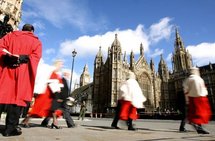Could London lose 'libel capital of the world' crown?
Alice Ritchie
LONDON, Alice Ritchie - The world's rich and powerful have long chosen London to defend their interests in court, but pressure is mounting for an overhaul in the English laws that saw it named "libel capital of the world".
Lawyers, freedom of speech campaigners and even members of the government are questioning whether legislation designed to protect people's reputations is now being used to silence criticism, especially by scientists.

English libel laws are widely viewed as some of the toughest in the world, a fact blamed for a stream of foreign claimants who come here to sue for defamation, prompting the press to dub London the world's "libel capital".
Concern about this so-called "libel tourism" and the law more generally have grown as it emerged that scientists are also being targeted.
Cardiologist Peter Wilmshurst is facing legal action here from US firm NMT Medical about comments he made on some of their research two years ago.
Meanwhile science writer Simon Singh is being sued by the British Chiropractic Association for a 2008 newspaper article in which he questioned the use of spinal manipulation in various childhood conditions.
NMT Medical and the BCA both argue they are not stifling debate but are fighting libellous remarks.
Their cases, which have yet to be resolved, have been taken up by campaigners as an issue of freedom of speech.
The British Medical Journal has warned that suing scientists for raising concerns could harm patient care.
"People whose scientific claims are questioned are turning to the law to attempt to silence their critics rather than engaging in open scientific debate," it said an editorial.
It added: "Weak science sheltered from criticism by officious laws means bad medicine."
Leading barrister Lord Gordon Barrie has also argued: "Scientists, other scholars, medical experts are becoming increasingly wary of challenging dubious claims... because of the chilling effect of the various aspects of libel law."
A defining feature of English libel law is that while claimants must only prove the comments made about them were defamatory, the defendant must show they were either true, 'fair comment' on an issue or in the public interest.
"The defendant carries the burden of proof," said a report published last month by two freedom of speech charities, Index on Censorship and English PEN, which have demanded widescale changes.
"The English approach to libel therefore suggests that the reputation of the claimant is more important than the free speech of the defendant."
Campaigners argue that foreign claimants eager to benefit from this tough approach are suing in English courts, which accept their cases simply because the offending item could be viewed or purchased online in Britain.
This has caused concern in the United States, where a bill passed the House of Representatives in June that would make English libel rulings invalid there.
"Libel tourism threatens the principles of free speech because foreign courts often don't place as difficult a burden on plaintiffs in libel cases," the US bill's co-author, Congressman Steve Cohen, said at the time.
The legislation was sparked by proceedings brought in London against US academic Rachel Ehrenfeld by Saudi businessman Khalid bin Mafouz over allegations in her book, "Funding Evil".
Neither party lived in London but the English court accepted jurisdiction because 23 copies of the book were brought in Britain over the Internet.
However, Paul Tweed, an Irish libel lawyer who has acted for US singers Britney Spears and Jennifer Lopez, denied either that change was required or that "libel tourism" was a problem.
He said most claimants sued here not because it was easy but because they had a reputation to defend here or had been libelled by a British publication.
In the Wilmshurst case, NMT Medical said it sued in England because the comments related to its research here involving British patients and doctors.
And Tweed said English libel laws provided a useful check on the media.
"The broadsheets (newspapers) in Britain are in my view among the most credible in the world simply because of our libel laws," he told AFP.
He added: "Most of my clients, their priority is to get an apology and a retraction as opposed to damages, but they need the leverage of the damages to get the former."
----------------------------------------------------------------------------------------------------------------------------------